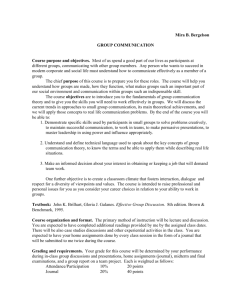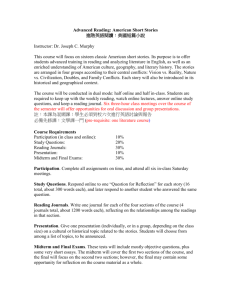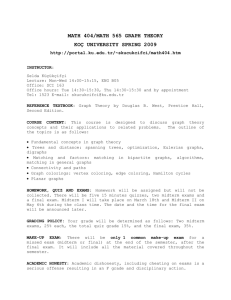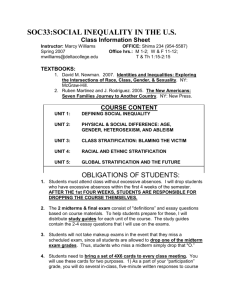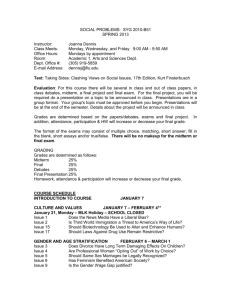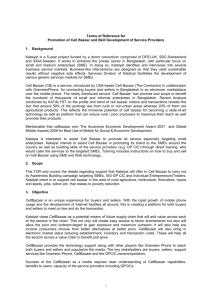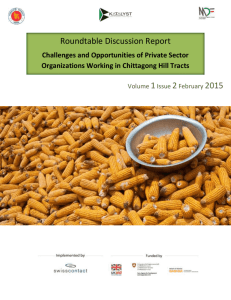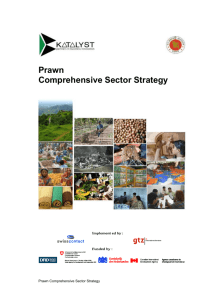Econ 422 Syllabus - Purdue University
advertisement
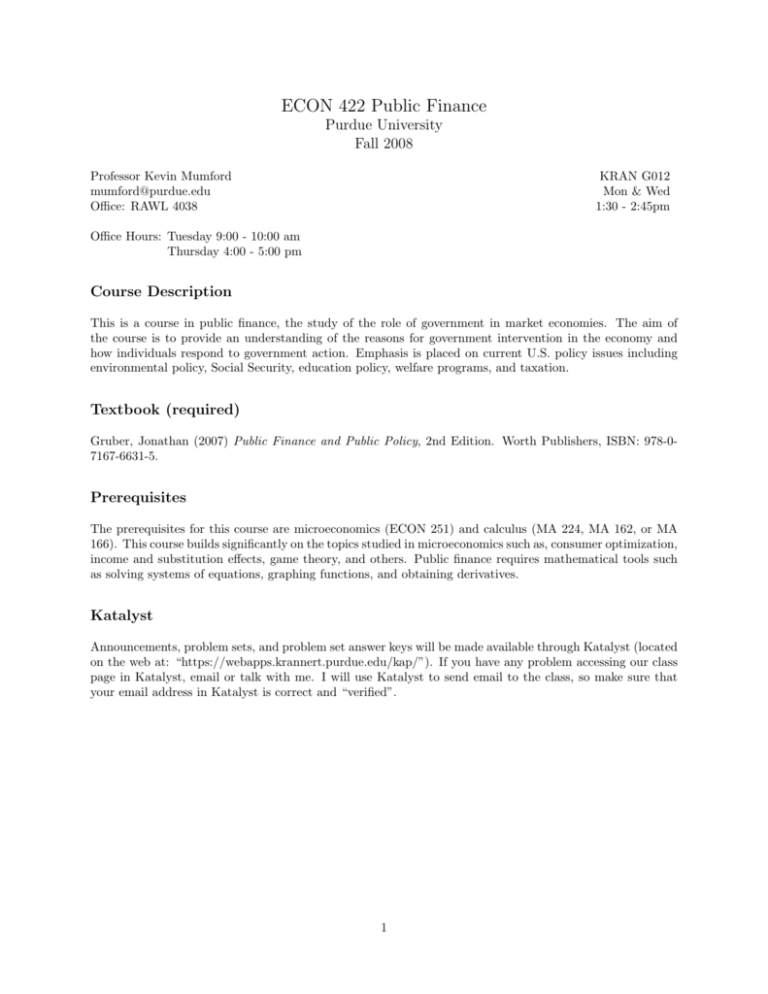
ECON 422 Public Finance Purdue University Fall 2008 Professor Kevin Mumford mumford@purdue.edu Office: RAWL 4038 KRAN G012 Mon & Wed 1:30 - 2:45pm Office Hours: Tuesday 9:00 - 10:00 am Thursday 4:00 - 5:00 pm Course Description This is a course in public finance, the study of the role of government in market economies. The aim of the course is to provide an understanding of the reasons for government intervention in the economy and how individuals respond to government action. Emphasis is placed on current U.S. policy issues including environmental policy, Social Security, education policy, welfare programs, and taxation. Textbook (required) Gruber, Jonathan (2007) Public Finance and Public Policy, 2nd Edition. Worth Publishers, ISBN: 978-07167-6631-5. Prerequisites The prerequisites for this course are microeconomics (ECON 251) and calculus (MA 224, MA 162, or MA 166). This course builds significantly on the topics studied in microeconomics such as, consumer optimization, income and substitution effects, game theory, and others. Public finance requires mathematical tools such as solving systems of equations, graphing functions, and obtaining derivatives. Katalyst Announcements, problem sets, and problem set answer keys will be made available through Katalyst (located on the web at: “https://webapps.krannert.purdue.edu/kap/”). If you have any problem accessing our class page in Katalyst, email or talk with me. I will use Katalyst to send email to the class, so make sure that your email address in Katalyst is correct and “verified”. 1 Grading The final grade for this course will be based on: • Participation in classroom simulation exercises (10%) • Problem Sets (30%) • Midterm Exam 1 (in-class) (15%) • Midterm Exam 2 (in-class) (15%) • Final Exam (30%) Participation You should attend all classes. Should you miss a class, it is your responsibility to find out from your classmates what happened during class. Six times during the semester, we will have a classroom activity where attendance is recorded and will count for your the final grade. These in-class activities are an important part of the instruction and must be experienced in person. Students can miss once with no grade penalty. Problem Sets You are encouraged to work on problem sets in small groups, however, problem sets must be submitted by individual students and not on behalf of a group of students. To be given credit, problem sets must be handed in by the deadline. You may email your problem set to me before the deadline if you cannot attend class on the day it is due. Instead of allowing exceptions to this rule, each student’s lowest two problem set scores will be excluded in calculating their average problem set score. This provides a method for handling late or missing assignments due to illness, a misunderstanding, emergencies, or other special circumstances. Exams The two midterm exams will be held in our regular classroom at the regular time. No late or make up exams are allowed for students who do not show up for the exam. It is possible to make alternative arrangements for the in-class midterm exam, but these arrangements must be made well in advance of the exam (don’t try to email the day before the exam expecting me to help you with an alternative arrangement). I will take precautions to prevent academic dishonesty. This includes random seating for examinations, exam proctoring, and photocopying of exams and assignments before returning them to students. Cheating on an assignment or an exam will result in a failing grade (a zero) for the assignment or exam. The final exam will be held during exam week. We will learn the exact time and location of our final exam later in the semester. Don’t make any plans that would take you away from the university during this week. No alternative arrangements are possible for students who do not take the final exam. Incomplete A grade of incomplete is allowed only if (a) the student’s course work is interrupted by unavoidable absence or other causes beyond the student’s control; (b) the work was passing at the time it was interrupted; and (c) completing the work does not require the student to repeat the course. The Dean of Students must give a recommendation that the circumstances warrant a grade of incomplete in order for it to be given. 2 Course Outline • Introduction to Public Finance (Chapters 1-4) The Role of Government • Externalities (Chapter 5) • Public Goods (Chapter 7) • Cost Benefit Analysis (Chapter 8) • Political Economy (Chapter 9) • State and Local Government (Chapter 10) • Social Security (Chapters 12-13) • Health Economics (Chapters 15-16) • Income Distribution and Welfare Programs (Chapter 17) Taxation • Federal Income Taxation (Chapter 18) • Tax Incidence (Chapter 19) • Optimal Taxation (Chapter 20) • Taxes on Labor Supply (Chapter 21) • Taxes on Savings (Chapter 22) • Taxes on Risk Taking and Wealth (Chapter 23) • Corporate Taxation (Chapter 24) • Fundamental Tax Reform (Chapter 25) Other Course Policies I will make the answers available when a problem set is returned so that students may review their own work and compare their answers to those on the answer key. After handing back graded assignments, I will not discuss the grading until students have had an opportunity to review their work and compare their answer with those on the answer key. I will not make an official answer key available for the midterm exam or for the final. I am willing to regrade the exam of any student who makes a request in writing. The formal written request should provide an explanation as to why the student believes a mistake in the grading was made. Disruptive behavior in class is not tolerated and is grounds for being asked to leave the class. This includes the use of cell phones in class. Remember to turn off your cell phone before class begins. Offensive or demeaning treatment of an individual where the treatment is based on race, color, religion, gender, national origin, or other protected status is not tolerated and is grounds for being asked to leave the class. Disruptive students will be referred to the Dean of Students Office for further action. In the event of a major campus emergency, course requirements, deadlines and grading percentages are subject to changes that may be necessitated by a revised semester calendar or other circumstances. Any changes would be announced in class and posted on Katalyst. 3


